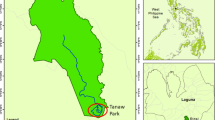Abstract
This paper explores the socio-cultural influence of the newly established ecotourism, which integrates cultural revitalization, ecological conservation and social development, in both Taroko National Park area and San-Chan aboriginal community. Many cases in different parts of the world indicate that the Indigenous peoples have developed patterns of resource use and management practices that reflect detailed knowledge of local geography and ecosystem, and contribute to the natural conservation through their living practices. The guidelines of Indigenous knowledge and culture lay the base for the development of ecotourism. A critical evaluation of the conceptualization of Indigenous knowledge is therefore, essential to the success of an alternative strategy to development for aboriginal communities. Participatory observation in the field of ecotourism activities and brief interviews are the major study methods, with several workshops conducted to supplement data collection for the two case studies. The Taroko area came into contact with tourists in a relative early era due to its famous natural features and national park. Its growing ecotourism is the result of cooperation among local residents, environmentalists, and academics, each with very different concepts of ecotourism operation. The national park and public sectors have also played significant role in shaping the content of ecotourism. In San-Chan community, due to the negative impacts generated by the unregulated mass tourism expansion, the local Indigenous people decide to close the public access to the attractive creek for 3 years, while at the same time promote ecotourism for poverty alleviation. These two cases embrace the ‘Nature’ as an important element in their construction of new place identity and community development. However, their spatial location in- or outside the national park produces significant differences and sociopolitical implications on the operations of ecotourism.

Similar content being viewed by others
Notes
Taroko is at the same time, a place name and an Indigenous people’s name. The group of Taroko people was only formally recognized by the official agency in 2004.
The concepts of tribe and community in aborigines’ living areas point to the temporal difference. Usually, in Taiwan’s context, tribe is used in a more or less nostalgic situation or when internal solitary is emphasized. Community is often referred to the similar modern ‘substitute’ of tribe (Chen 2002). The official reference for the Indigenous settlement is ‘community’.
References
Barkin, D., & Bouchez, C. P. (2003). NGO-community collaboration for ecotourism: A strategy for sustainable regional development. In M. Luck & T. Kirstges (Eds.), Global ecotourism policies and case studies: Perspectives and constraints (pp. 73–81). Clevedon, UK: Channel View Publications.
Blamey, R. K. (2001). Principles of ecotourism. In D. B. Weaver (Ed.), The encyclopedia of ecotourism (pp. 5–22). New York: CABI Publishing.
Briggs, J. (2005). The use of indigenous knowledge in development: Problems and challenges. Progress in Development Studies, 5(2), 99–114.
Briggs, J., & Sharp, J. (2004). Indigenous knowledges and development: A postcolonial caution. Third World Quarterly, 25(4), 661–676.
Ceballos-Lascurain, H. (2003). Preface. In M. Luck & T. Kirstges (Eds.), Global ecotourism policies and case studies: Perspectives and constraints (pp. viii–xii). Clevedon, UK: Channel View Publications.
Chen, Y. F. (2002). The impacts of the September 21st earthquake on indigenous peoples’ land rights and the reconstruction of place identity in Taiwan. Journal of Geographical Science, 31, 1–15. (See also http://www.geog.ntu.edu.tw/journal/article/G31-01.pdf. Retrieved July 27, 2009).
Cresswell, T. (2004). Place: A short introduction. Oxford: Blackwell.
Fennell, D. A. (1999). Ecotourism: An introduction. London: Routledge.
Formosa Community (2006). Retrieved July 27, 2009, from http://sixstar.cca.gov.tw/blog/pratan/communityNewsPublishListAction.do?method=doRead&contentId=54630 (in Chinese).
Harvey, D. (1996). Justice, nature and the geography of difference. Oxford: Blackwell.
Hipwell, W. T. (2007). Taiwan aboriginal ecotourism: Tanayiku natural ecology park. Annals of Tourism Research, 34(4), 876–897.
Honey, M. (1999). Ecotourism and sustainable development. Washington, DC: Island Press.
Howitt, R., Connell, J., & Hirsch, P. (1996). Resources, nations and indigenous peoples. In R. Howitt, J. Connell, & P. Hirsch (Eds.), Resources, nations and indigenous peoples: Case studies from Australia, Melanesia, and Southeast Asia (pp. 1–30). Oxford: Oxford University Press.
MacCannell, D. (1989). The tourism:A new theory of the leisure class (2nd ed.). Berkeley, CA: University of California Press.
McGregor, D. (2004). Traditional ecological knowledge and sustainable development: Towards coexistence. In M. Blaser, H. A. Feit, & G. McRae (Eds.), In the way of development: Indigenous peoples, life projects and globalization (pp. 72–91). London: Zed Books.
Murphy, A. B. (1991). Regions as social constructs: The gap between theory and practice. Progress in Human Geography, 15(1), 22–35.
Neumann, R. P. (2005). Making political ecology. London: Hodder Arnold.
Peace, A. (2005). Managing the myth of ecotourism: A Queensland case study. The Australian Journal of Anthropology, 16(3), 321–334.
Richards, G., & Hall, D. (2000). The community: A sustainable concept in tourism development? In G. Richards & D. Hall (Eds.), Tourism and sustainable community development (pp. 1–13). New York: Routledge.
Sirakaya, E. (1997). Attitudinal compliance with ecotourism guidelines. Annals of Tourism Research, 24(4), 919–950.
Strang, V. (2004). Close encounters of the third world kind: Indigenous knowledge and relations to land. In A. Bicker, P. Sillitoe, & J. Pottier (Eds.), Development and local knowledge (pp. 93–117). New York: Routledge.
Zeppel, H. D. (2006). Indigenous ecotourism: Sustainable development and management. Oxfordshire, UK: CABI Publishing.
Acknowledgments
The author is grateful for the funding support of National Science Council (NSC) in Taiwan, project # NSC 96-2621-Z-259–004.
Author information
Authors and Affiliations
Corresponding author
Rights and permissions
About this article
Cite this article
Yi-fong, C. The indigenous ecotourism and social development in Taroko National Park area and San-Chan tribe, Taiwan. GeoJournal 77, 805–815 (2012). https://doi.org/10.1007/s10708-010-9373-7
Published:
Issue Date:
DOI: https://doi.org/10.1007/s10708-010-9373-7




